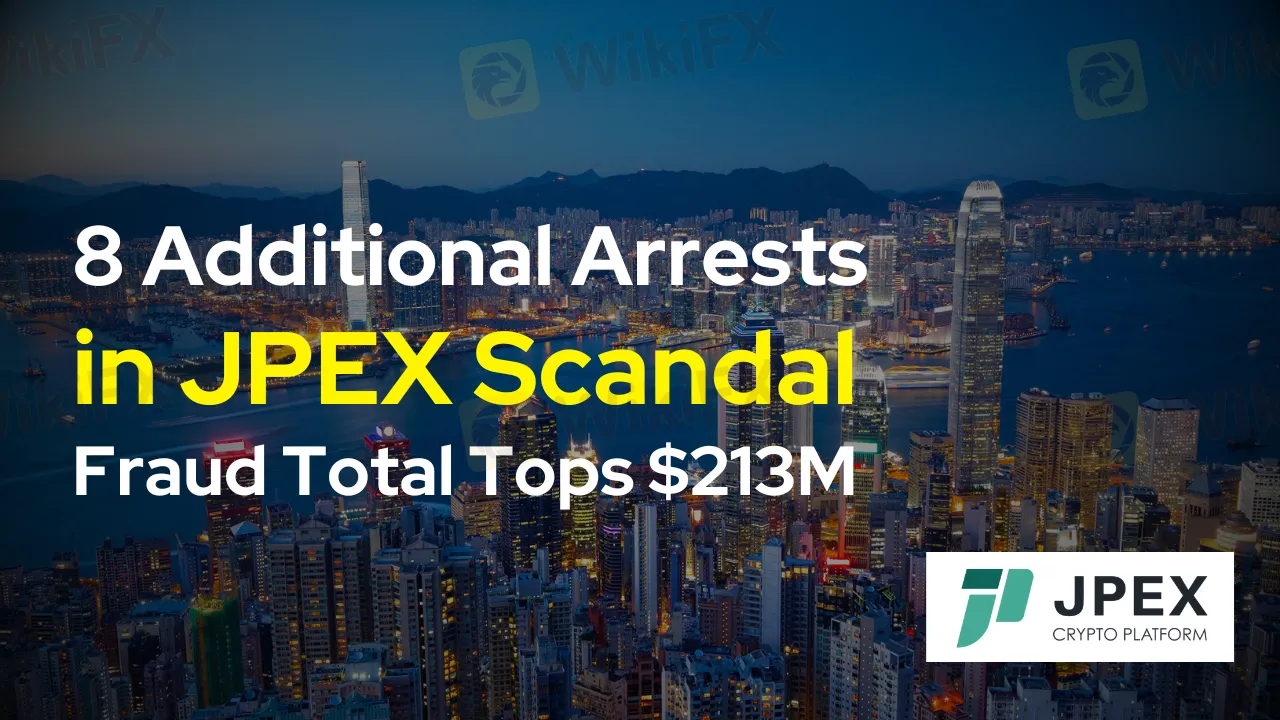简体中文
繁體中文
English
Pусский
日本語
ภาษาไทย
Tiếng Việt
Bahasa Indonesia
Español
हिन्दी
Filippiiniläinen
Français
Deutsch
Português
Türkçe
한국어
العربية
8 Additional Arrests in JPEX Scandal, Fraud Total Tops $213M
Abstract:JPEX Scandal Update: 8 New Arrests, $213M Fraud Total, and Cryptocurrency Shockwaves in Hong Kong. Get the latest on the ongoing investigation and regulatory changes in the crypto community.

Hong Kong, - The notorious JPEX scandal took another turn yesterday as the Hong Kong Police made 8 more arrests, bringing the total number of those taken into custody in connection to this case to 36.
This fraud case has shaken the crypto community, with a staggering 2,595 individuals reporting losses due to their dealings with the JPEX crypto exchange. The total defrauded amount has reached a monumental sum of 1.6 billion yuan, which translates to a whopping $213 million. To put things into perspective, the initially suspected fraud amount hovered around $154 million, showing the sheer magnitude of the scam.
Sources reveal that the Dubai-based JPEX had been trading without an authentic license, as stated by the Hong Kongs Securities and Futures Commission (SFC) last month. This lapse further raises questions about the integrity of the platform and its operations in the city-state.

As the investigation of the JPEX scandal continues, the arrested individuals have been released on bail, and they are scheduled to report back to the police from late this month until December. Among those investigated include significant influencers, such as Joseph Lam, who goes by the moniker “Trolling King” on Instagram. The former barrister turned insurance salesman has a notable presence in the social media scene. Another prominent figure is Chan Yee, a YouTube personality with a following of 200,000 subscribers.
Local media outlets have reported that the Hong Kong Police's investigation into the JPEX crypto exchange remains active. The possibility of more arrests is still very much on the table.
In light of the JPEX scandal, Hong Kong's crypto regulations are undergoing a significant transformation. Louise Ho Pui-shan, Hong Kongs Commissioner of Customs and Excise, has vocally advocated for amplified regulatory measures. This call to action stems from the growing concerns about money laundering within the crypto realm.
The adverse effects of this scandal have prompted the citys financial watchdogs to revisit governance protocols for cash-for-crypto shops. Additionally, the Hong Kong Monetary Authority, in conjunction with the Securities and Futures Commission, has rolled out more stringent cryptocurrency guidelines. These revised regulations primarily target professional investors, emphasizing the inherent complexities and potential risks tied to virtual asset-related products.
Related news:
About JPEX Scandal
Last month, people using JPEX had problems taking out their money because the platform made withdrawal costs very high. The SFC said the platform made untrue statements about being controlled in Dubai.
JPEX advertised a lot, using big signs and online famous people to get more users. Some of these famous people have been taken by the police.
This JPEX issue has made people in Hong Kong not trust this kind of investment. 28 people connected to this problem have been taken by the police after 2,500 people complained. The police are still looking into it.
Bitrace, a digital money tracking company, said last month that some online money related to JPEX was used in bad ways, like for illegal betting. This has made people worry about the safety of the online money.

Disclaimer:
The views in this article only represent the author's personal views, and do not constitute investment advice on this platform. This platform does not guarantee the accuracy, completeness and timeliness of the information in the article, and will not be liable for any loss caused by the use of or reliance on the information in the article.
Read more

First Unfair Trading Case Reported Under South Korea’s Virtual Asset User Protection Act
The Financial Services Commission (FSC) of South Korea has disclosed the first case of unfair trading following the enactment of the Virtual Asset User Protection Act. This law, which took effect in July 2024, aims to regulate the cryptocurrency market and protect investors from fraud and market manipulation.

Upbit Faces Severe Penalties for AML and KYC Violations
Upbit, South Korea’s leading cryptocurrency exchange, faces severe penalties for over 700,000 AML and KYC violations.

BSP Pushes for a Cashless Philippines by 2025
The BSP accelerates cashless transactions, aims for a coin-lite society, eliminates small fund transfer fees, and drives financial inclusion by 2025.

Maya Bank Disburses PHP 68B in Loans, Sets 2024 Record
Maya Bank disburses PHP 68B in loans in 2024, advancing financial inclusion with digital banking innovation, BSP compliance, and secure financial solutions.
WikiFX Broker
Latest News
How Long Can the Dollar Remain Strong?
Forex Price Trend Prediction! | Come be a New Year Price Winner!
HFM NY Special Offer!
How a Promised RM1.4 Million Return Turned into a Costly Scam
Cinkciarz.pl Under Fire: Frozen Accounts, Missing Funds
First Unfair Trading Case Reported Under South Korea’s Virtual Asset User Protection Act
“Predict and Win” Big Rewards! Join the Contest Now
South Korean President Yoon Suk Yeol's Arrest Shakes Markets
Titanium Capital LLC Ponzi Scheme: Henry Abdo Admits Fraud, Impacting Over 200 Investors
South Korea's Crypto Regulation Updates for 2025
Currency Calculator







